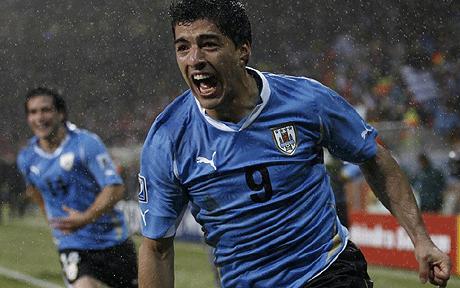
Anyone craving a first World Cup semi-final for Africa is hereby instructed, in the style of the Saturday night sportscaster, to look away now.

Taking aim: Uruguay' s leading goalscorer Luis Suarez has Ghana in his sights
This applies particularly to ITV pundit Marcel Desailly, ever more Ghanaian and ever less French as the tournament has drawn on.
Marcel, if you're disobediently still with us, the omens could scarcely be worse if you glanced up later today to see an eagle draped in the Ghanaian flag fly straight into the engine of a Boeing 777 operated by Pluna, national carrier of Saturday's quarter-final opponents, Uruguay.
As sole African survivor and bearer of a continent's feverish hopes, the land of Desailly's birth is effectively the honorific host nation now and when it comes to the breaking of hostly hearts, the World Cup knows no more brutal party-pooper than this long dormant South American giant.
Even today, mention of July 16, 1950, reawakens melancholy and despair in Brazilian souls. Although among football's early superpowers, having won the inaugural World Cup of 1930 as hosts themselves, Uruguay were universally regarded as lambs to the slaughter when they met Brazil in Rio to launch the newly built Maracana stadium on a lake of tears.
With the winners emerging from a group rather than a knockout match, Brazil needed only to draw. They took the lead soon after half-time, but suffered what probably remains the most seismic shock in football history. Uruguay equalised, and when, with 11 minutes remaining, Alcides Giggia scored their winner, the 200,000 spectators were struck dumb.
"The silence was morbid," observed a long-forgotten tournament organiser called Jules Rimet, who had prepared his speech in Portuguese (the counting of unhatched chickens has seldom known the like; the winner's gold medals already inscribed with Brazilian names) but not in Spanish.
"Everywhere has its irredeemable national catastrophe, something like a Hiroshima," wrote the playwright Nelson Rodrigues, so curiously overlooked when the publishers of The Lusophone Guide To Classic English Understatement were seeking an author. "Our catastrophe, our Hiroshima, was the defeat by Uruguay in 1950."
Twenty years on in Mexico, Brazilian history seemed poised to defy Marxist definition by repeating itself as further tragedy. In the 1970 semi-final, the last decent Uruguayan side until this one took an early lead against Pele's demigods, who were palpably constrained by traumatic national muscle memory.
Clodoaldo equalised, brilliantly, on the stroke of half-time, the torpor lifted, and Brazil went on to win with the mandatory Jairzinho goal and another from Rivelino. This was the last seen of Uruguay as a major World Cup force for four decades.
It had been a minor miracle that a tiny country of barely three million people had punched so far above its weight for so long, and miracles do not last. What punching ensued was more literal, as a succession of hyper-soporific, goal-free sides, leavened only by the lavish attacking talent of Enzo Francescoli, made Uruguay more associated with scything viciousness than Fray Bentos or the harbouring of refugee Nazis.
Jose Batista's red card within the first minute of their 1986 group game with Scotland neatly captured their post-1970 reputation.
For all that, it's a pleasure to see this World Cup Rip van Winkle awakening at last. This is a solid, cohesive, disciplined and blessedly unpsychotic unit elevated by the scintillating form Diego Forlan guarded so jealously from fans of Manchester United.
The romantic in us may go for Ghana because its high time the host continent made the breakthrough to the semis, and the reaction shots of Marcel Desailly bear-hugging Adrian Chiles close to death would be a joy to behold.
But cool logic and the bookies' odds insist that, having already crushed South Africa 3-0 in the group stage, Uruguay will poop the party yet again to book a seemingly guaranteed semi-final rematch with Brazil.
If so, there won't be a heart from Recife to Sao Paulo that doesn't flutter arrhythmically at the prospect.
The isotope released by the Uruguyans who made "Maracanazo" pan-South American slang for victorious underdogs has a devilishly long half-life, and the radiation sickness persists to this day.
- Octopus Paul v Ahmadinejad [28/07]
- France suspend entire World Cup squ [24/07]
- Webb says World Cup final was taint [23/07]
- Goal-line technology off Fifa agend [20/07]
- World Cup final ball sold for £48K [18/07]
- Evra 'is being victimised', says Fe [17/07]
- Scolari says no offer yet to coach [16/07]
- Beckham: England players must take [15/07]
- Messi says WCup loss left him with [15/07]
- Now it's Brazil's turn to get ready [15/07]
| Years | Winners | Runner-up | Third place |
| 2006 | Italy | France | Germany |
| 2002 | Brazil | Germany | Turkey |
| 1998 | France | Brazil | Croatia |
| 1994 | Brazil | Italy | Sweden |
| 1990 | Germany | Argentina | Italy |
| 1986 | Argentina | Germany | France |
| 1982 | Italy | Germany | Poland |
| 1978 | Argentina | Holland | Brazil |
| 1974 | Germany | Holland | Poland |
| 1970 | Brazil | Italy | Germany |
| 1966 | England | Germany | Portugal |
| 1962 | Brazil | Czech | Chile |
| 1958 | Brazil | Sweden | France |
| 1954 | Germany | Hungary | Austria |
| 1950 | Uruguay | Brazil | Sweden |
| 1938 | Italy | Hungary | Brazil |
| 1934 | Italy | Czech | Germany |
| 1930 | Uruguay | Argentina | America |


